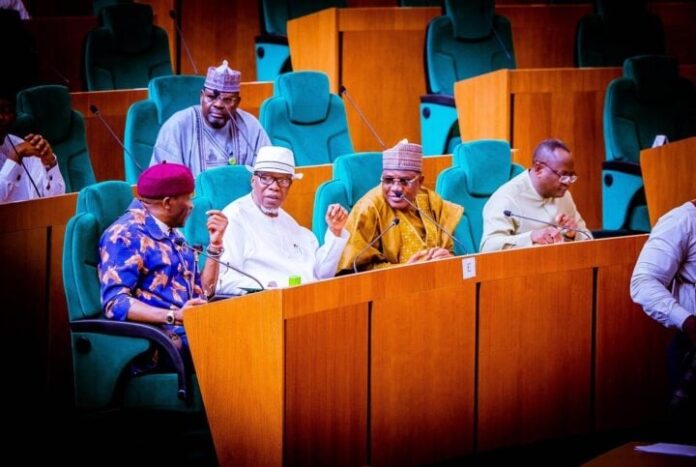House of Reps blasts US bill alleging state-sponsored Christian ‘genocide’
The House of Representatives has unanimously condemned a proposed US bill that seeks to sanction Nigerian officials for allegedly “facilitating the mass murder of Christians.” The lower legislative chamber firmly rejected the notion of state-sponsored persecution of Christians in Nigeria.
The resolution was passed during Wednesday’s plenary following a motion sponsored by Deputy Speaker Benjamin Kalu and all 359 other lawmakers.
READ ALSO: House of Reps proposes bill to stop public officials from using private hospitals, schools
The US Legislation
US Senator Ted Cruz proposed the bill, christened the ‘Nigeria Religious Freedom Accountability Act of 2025,’ which aims to protect “persecuted” Christians in the country.
The legislation would specifically “hold Nigerian government officials accountable for ‘facilitating the mass murder of Christians'”; call for “targeted sanctions against Nigerian officials who enforce Sharia and blasphemy laws”; require the “US secretary of state to designate Nigeria as a country of particular concern”; and require that “Boko Haram and ISIS-West Africa remain designated as entities of particular concern.”
This bill follows “growing fears globally about ‘rising anti-Christian’ behaviours in Nigeria,” a narrative that the Nigerian federal government has repeatedly rejected.
READ ALSO: Customs approves new trade rule, demotes officers for misconduct
The Nigerian Legislature’s Response
Moving the motion, lead sponsor Kalu noted that the US Commission on International Religious Freedom (USCIRF) recently recommended Nigeria for a Country of Particular Concern (CPC) designation, “citing persistent violations and state failures to protect against non-state actor abuses.”
He countered that Nigeria’s constitution “guarantees freedom of thought, conscience and religion and bars adoption of a state religion,” and that “successive administrations, security agencies, faith leaders and civil society continue to undertake measures to protect all worshippers and prosecute offenders, as reflected in the US Department of State’s 2023 country chapter and prior reports.”
Kalu emphasised that the nation’s insecurity “is complex, driven by insurgency, criminal banditry, farmer-herder conflict, separatist violence and communal disputes, affecting citizens of all faiths, with international reporting attributing a significant share of fatalities to terrorist groups and criminal gangs rather than state policy or a single religious dynamic.”
He warned that external legislative actions “based on incomplete or decontextualised assessments” risk “undermining Nigeria’s sovereignty, misrepresenting facts, straining strategic relations, and unintentionally emboldening violent actors.”
READ ALSO: House of Reps summon CBN Governor, Finance Minister over unremitted funds
Contributions from Other Lawmakers
Majority Leader Julius Ihonvbere voiced concern that the bill “has scaled second reading in the US senate, and if it is passed into law, it will cost the country more resources to reverse.” He stated that Nigerians are concerned about “existential challenges such as economic, social, and security issues, not religious persecution.”
He concluded that “There is an agenda designed to mark the progress made so far in Nigeria’s democracy.”
Oluwole Oke, the chair of the House Committee on Foreign Affairs, pointed out that the US Senate denied “Nigerians and Nigerian missions attendance in the bill’s public hearing,” calling it “a deliberate attempt to damage Nigeria’s image.”
Billy Osawaru described the matter as “global politics” and lamented that “Nigeria does not have an ambassador to the US who should have engaged the American senate to clarify the situation in Nigeria.” He added, “It is not enough to say we are being targeted, but we must implement a system to fight this. Nigeria does not have an ambassador in the US. If we let this scale through, Nigeria will be the first in Africa.”
Final Resolutions
Consequently, the House officially rejected “narratives that frame Nigeria’s security crisis as a singularly religious conflict or as state-sponsored persecution, and reaffirms Nigeria’s constitutional protections for freedom of religion and belief.”
The parliament asked the Ministry of Foreign Affairs and the embassy in Washington, DC, to lodge a formal complaint at the United Nations.
It also urged interested US legislators to propose a Nigeria-US joint fact-finding and dialogue. The committee on legislative compliance is to ensure the execution of the resolutions and report back to the House within 28 days.
READ ALSO: Bill limiting presidential candidates age to 60 passes 2nd reading at House of Reps
Follow the Neptune Prime channel on WhatsApp:
Do you have breaking news, interview request, opinion, suggestion, or want your event covered? Email us at neptuneprime2233@gmail.com





